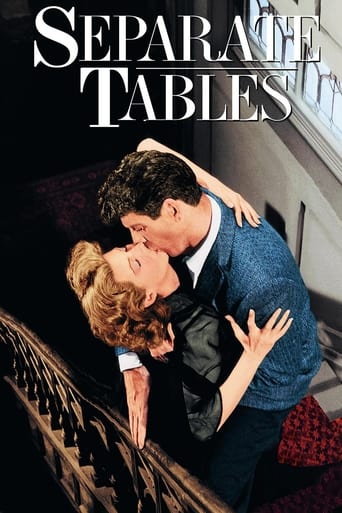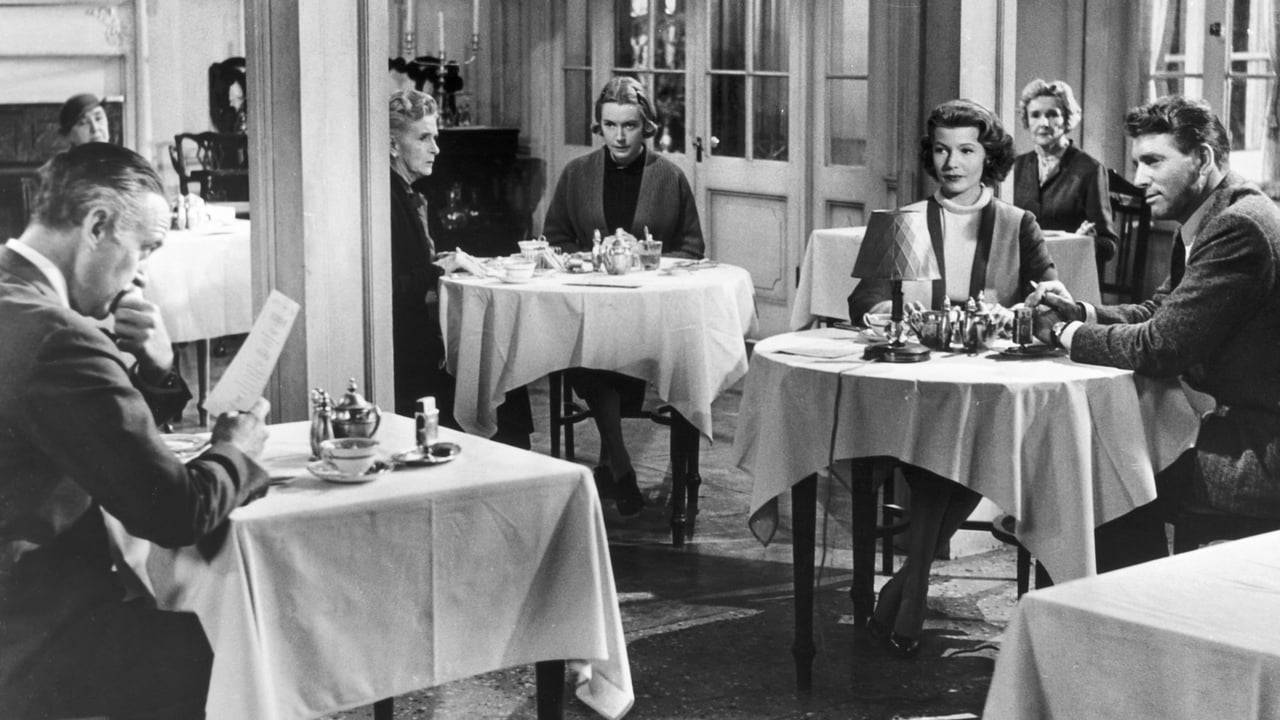marcslope
She plays a shy virgin saddled with an awful mother (Gladys Cooper, essentially reprising her turn in "Now, Voyager") and obsessed with the glad-handing, deceiving military man living in the same residential hotel (David Niven, who deserved his Oscar), and she drives me nuts. It's like Deborah Kerr playing Carol Burnett playing Deborah Kerr, so overplaying the shyness and awkwardness and terror over sex that it crosses over into parody. The rest of this opus, cooked up from some short Terence Rattigan plays, is quite good. It's a starry hotel, with Burt Lancaster planning to marry hotel manager Wendy Hiller (another deserved Oscar) but distracted by the return of ex-wife Rita Hayworth, and a young Rod Taylor as a medical student we tend to forget about, and Cathleen Nesbitt as an old biddy a good deal more sympathetic than Ms. Cooper. The short stories are skillfully interwoven, and it's franker about sex than much 1958 product. But just as you're settling into it, along comes Deb stammering and gurgling and getting hysterical over nothing. She's such a brilliant actress, I don't know who steered her wrong on this one.
talisencrw
Mann's film will certainly please those who are fans of 'Grand Hotel' and other such star-packed films with a soap operatic-flavor, although it definitely is smaller in scale. It has several of my favourite stars from that era, such as Deborah Kerr, Rita Hayworth, David Niven, Dame Wendy Hiller, Burt Lancaster and Rod Taylor, and their interplay befits such fine casting. It's weird seeing Lancaster and Niven cast as rogues, that a film set in Dorset, England was made entirely in Hollywood and that the screenplay was an amalgamation of two one-act plays by Terence Rattigan, opened up in order to include more stars. The endeavor worked, as Best Adapted Screenplay was one of its seven Oscar nominations (it ended up winning two, for Niven and Hiller's performances). I heartily recommend the film to anyone who enjoys either any of the aforementioned stars or fine films of the era (especially ones about the British, and ones derived from the stage). It'll certainly be 100 minutes worthy of your effort--Mann was one of the best at this sort of thing (also see 'Marty' if you have any such doubts)...
Holdjerhorses
Having recently watched "You Were Never Lovelier" with Fred Astaire and Rita Hayworth, it's interesting to notice how she was largely shot and directed throughout her career.Her dancing in "Lovelier" was fun and fine in "The Shorty George," where she's relaxed and clearly having a ball -- and appears to be keeping up with Astaire. "Appears" is the operative word. Astaire (who choreographed) carefully kept their routines within Hayworth's range, never challenging her beyond her capacities. But Hayworth completely lacked Ginger Rogers' lithe body fluidity and on screen electricity.Hayworth was stunningly beautiful, of course. But even in "Lovelier" there are moments when, not carefully lit, the forehead lines that were so apparent in later years (unless also carefully lit) were already apparent and fleetingly distracting.More to the point was how she was directed and photographed in "Lovelier." She actually has very few lines. What she does have are usually brief and delivered in a relatively quick take before cutting away.She never makes emotional transitions in a scene. Rather, the camera cuts to a new angle when she's called on to register a different emotion. The primary goal at all times is to maintain her seemingly flawless facial beauty. Fine in a fluff piece like "Lovelier."Cut to "Separate Tables" 16 years later.Hayworth is still beautiful if more "mature." AGAIN she is never shown making an emotional transition in one shot: cutaways are instead employed. The technique (to disguise her limited acting abilities) is particularly jarring in her dramatic scene in her bedroom with Burt Lancaster. On closer inspection, she "poses" from cut to cut rather than displaying her character's emotional arcs.Sure, she was supposed to be an aging model, all self-possessed poise. But not in that dramatic scene.Still, it's a fascinating lesson in how skilled film making disguises limited range. (For a heartbreaking account of the making of her last film, read Frank Langella's "Dropped Names.")Terence Rattigan's play was forced to disguise the homosexual "scandal" of the Major's (David Niven) being arrested for soliciting men in dark movie houses, though the implication is fairly clear.Knowing the repression of homosexuality at that time makes Niven's performance even more involving; especially once the scandal is revealed to the boarders at the Beauregard.Niven's amazing performance (in only 16 minutes of screen time) is disarmingly deep. He goes from an almost comical figure to an exposed fraud with a dark secret since childhood, to a lost late-middle-aged man with no future, to the final hope of redemption.Niven shows all his character's subtle emotional transitions in sustained takes (unlike Hayworth).Deborah Kerr is fine and completely convincing, as always.Burt Lancaster gives another version of Burt Lancaster in not his finest hour. "Sweet Smell of Success," "The Rose Tattoo," "Come Back, Little Sheba," "Birdman of Alcatraz" and "Judgment at Nuremberg" -- even "Trapeze" -- are better records of his talents. But he's always believable.The remaining cast, especially the nuanced Wendy Hiller, are terrific.Still, it's Hayworth's impression -- not her character's -- who lingers as something not quite real, not untalented, but unrealized and somewhat vacant. It's not her mental deterioration. It was there on screen from the beginning. She tried gamely throughout her career, and looked magnificent thanks to careful costuming, lighting and cinematography. But even with careful cutaway direction she seems little more than a paper doll -- and finally, tragically, just as fragile.
jc-osms
About as far removed from his American playwright contemporary Tennessee Williams as you could get, yet there's a place in my heart for English dramatist Terence Rattigan and his perhaps subtler expositions of motive, need, weakness and ultimately dignity in the human condition.Interestingly, this movie adaptation of his mid 50's play, slightly improbably makes prominent use of American actors, although fortuitously possibly, this helps to elevates its status to a wider and higher level and almost certainly helped it to get noticed by the Academy at the awards round.Director Mann doesn't try too hard to "open out" the play for the cinema, realising its strength lies in depicting the enclosed stultifying world of the not-quite "Grand Hotel", it acting as a metaphor for the trapped existences of its various inhabitants. That said, none of the main characters hardly seem drawn from reality, but once you concede the writer's dramatic licence, you have to admire his skill in their interplay and the well-managed conclusion which works too as an indictment against narrow-minded intolerance as the fellow-guests at last react against flinty old Lady Matheson (Cathleen Nesbitt) and her petty-minded outrage at and desired expulsion of David Niven's disgraced "Major" character. Niven won the Oscar for his performance and you can see why, moving from blustery, caddish bonhomie (his "what what" refrain really gets on your nerves as he himself honestly admits) to his awkward embarrassed demeanour at the end. In support, I also enjoyed the playing of Wendy Hiller as the school-marmy hotelier, Deborah Kerr as Nesbitt's sexually repressed daughter and Gladys Cooper as her put-upon friend who like the daughter rises up but gently to overturn the Major's victimisation and rehabilitate him.It doesn't all work, Lancaster and Hayworth's story seems to belong in a different play / film and the minor parts are too sketchily drawn (Rod Taylor and his randy girlfriend too obviously counterpointing the sexual gaucheness of Kerr's Sibyl) and a too obvious Margaret Rutherford type inserted no doubt to add some humour.I'm pretty sure it would have made for a better night out at the theatre than the cinema, but I wouldn't deny the play's elevation to a wider audience and certainly didn't regret checking in on this occasion.



 AD
AD




